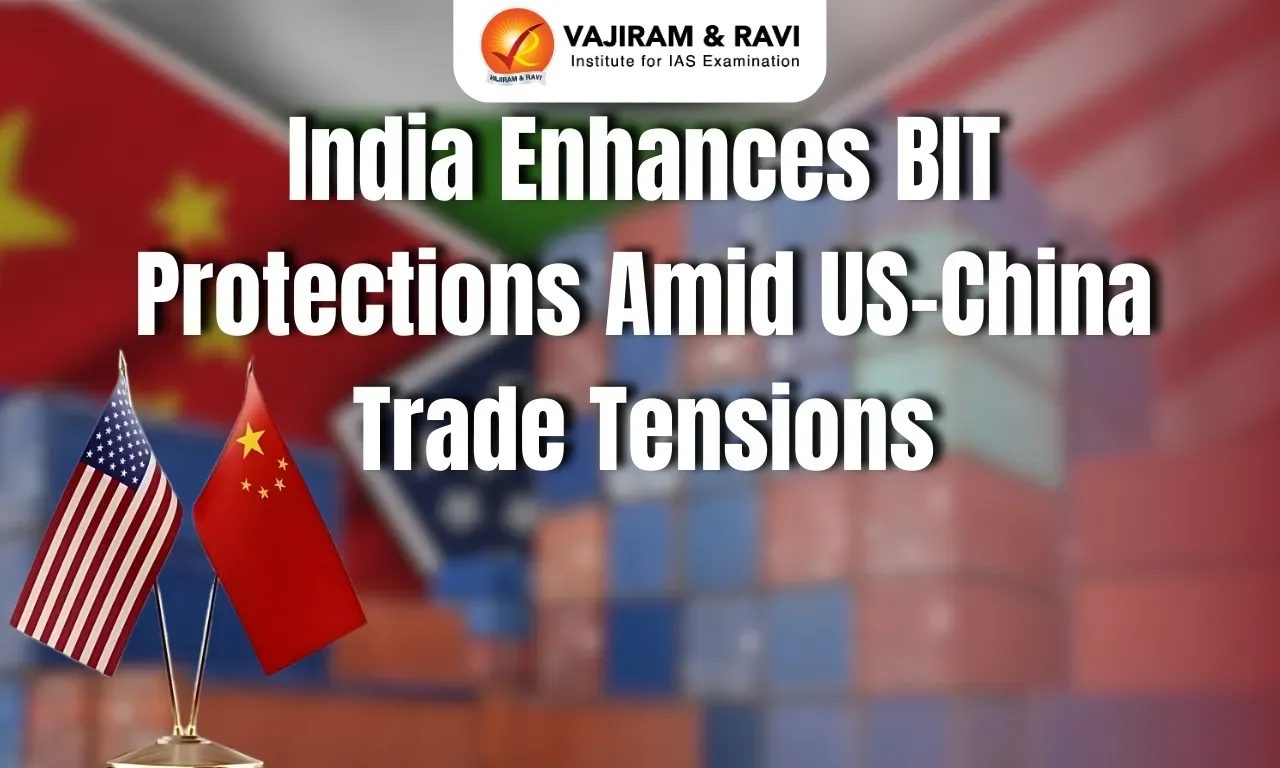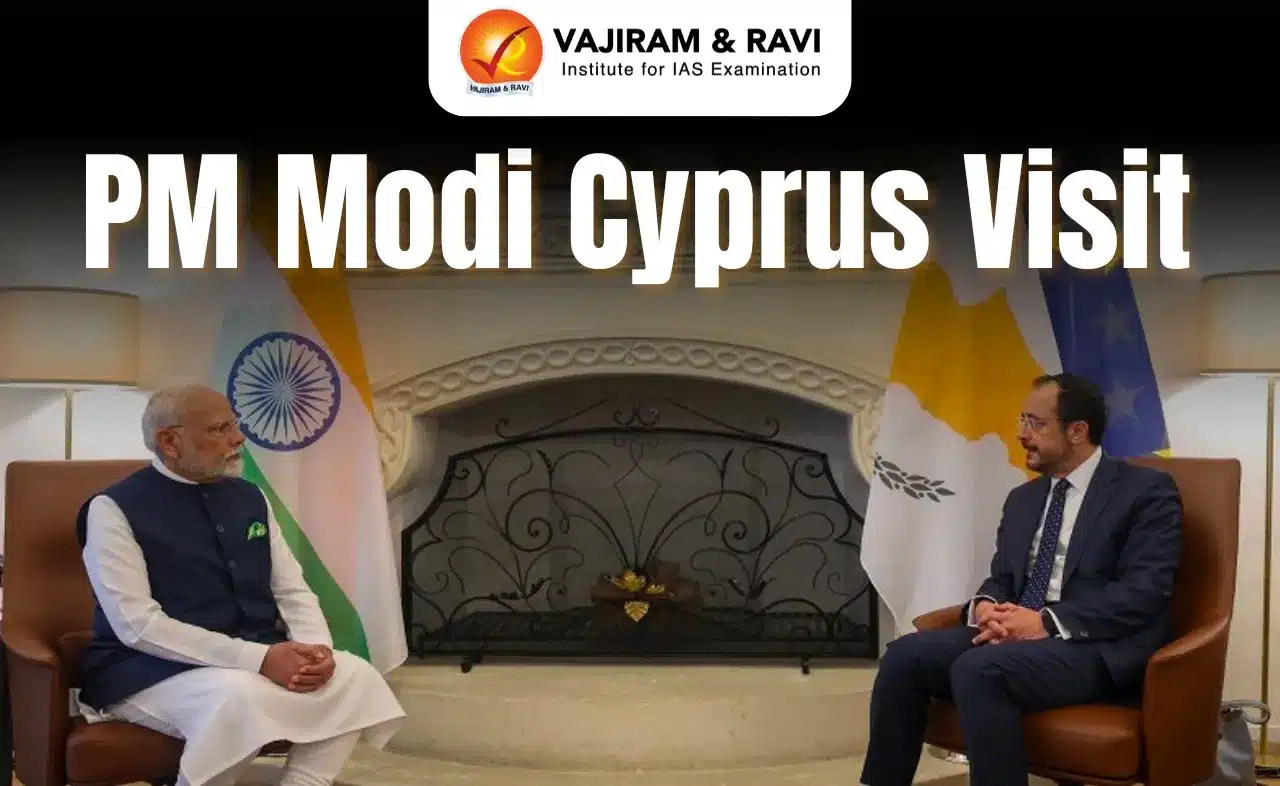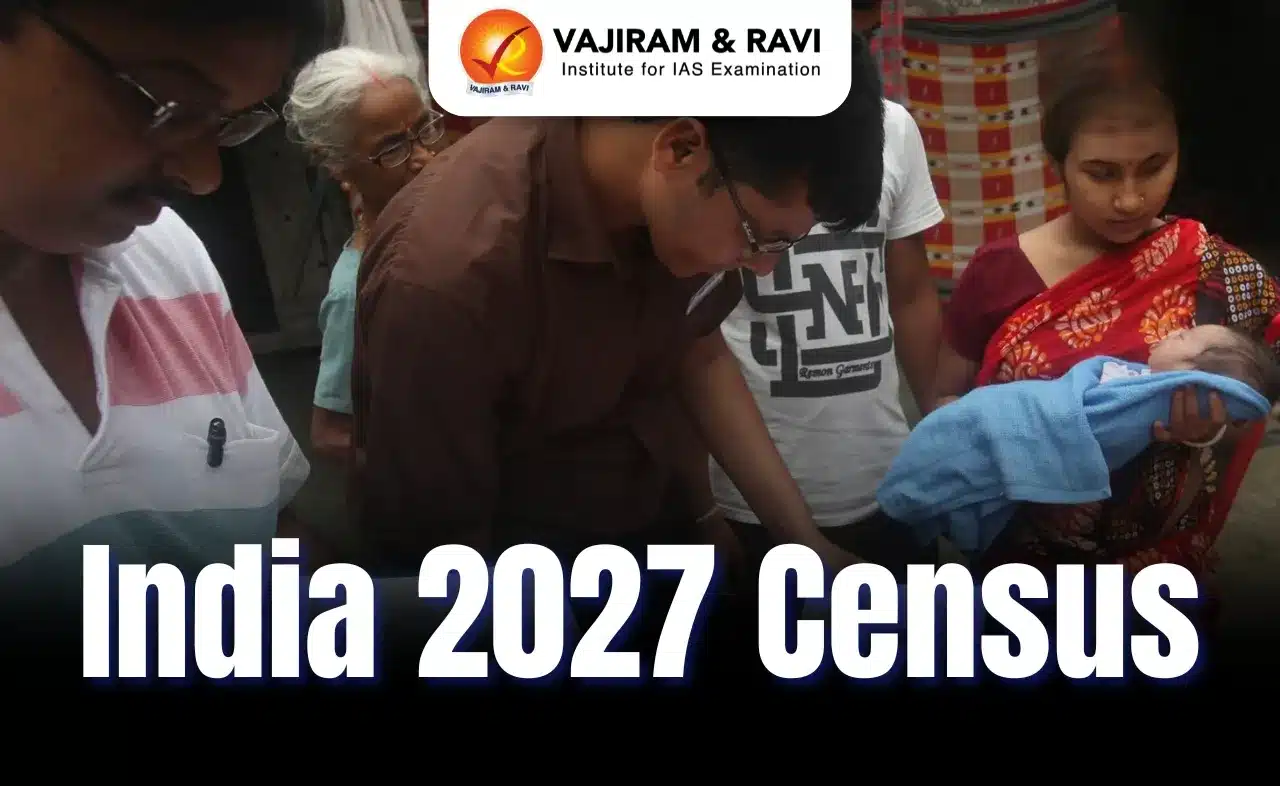What’s in Today’s article?
- Bilateral Investment Treaty (BIT) Latest News
- High Regulatory Risks in India Deter Foreign Investment
- Local Remedy Requirement in UAE BIT
- India Eyes Gains from US-China Trade War
- US Retaliation Could Boost Indian Exports
- Bilateral Investment Treaty (BIT) FAQs
Bilateral Investment Treaty (BIT) Latest News
- India is preparing to revamp its 2016 model Bilateral Investment Treaty (BIT) to offer better protection for foreign investors, responding to concerns from Western trade partners amid shifting global trade dynamics due to the US-China trade war.
- The Union Budget highlighted the need for reform, as India negotiates investment treaties with the UK, EU, and EFTA, which has pledged $100 billion in investments over 15 years.
- The govt has stated that groundwork has begun, citing the UAE BIT as a model for a more investor-friendly approach, including asset-based protection and coverage for Foreign Portfolio Investments (FPIs).
High Regulatory Risks in India Deter Foreign Investment
- Experts emphasized the need for stronger investor protections in India due to significant regulatory risks. The latest instance being the Nestlé case.
- Switzerland suspended the Most-Favoured-Nation (MFN) clause in its 1994 Double Taxation Avoidance Agreement (DTAA) with India in December 2024.
- This followed an Indian Supreme Court ruling stating that the DTAA is unenforceable unless notified under the Income Tax Act.
- Consequently, Swiss companies like Nestlé now face higher taxes on dividends.
Impact of Retroactive Tax Laws and License Cancellations
- Analysts have noted that India has faced numerous investor disputes arising from retroactive tax changes, such as in the Vodafone case, and arbitrary license cancellations, like in the Devas case.
- These actions, coupled with prolonged judicial delays in arbitration, leave investors with limited recourse.
Shifting Away from Investor Rights in BITs
- India’s decision to annul older Bilateral Investment Treaties (BITs) after unfavorable international court rulings led to the adoption of the 2016 model BIT, which prioritizes state rights over investor rights.
- The inclusion of an “exhaustion of local remedies” clause is intended to reduce international litigation against India.
Local Remedy Requirement in UAE BIT
- The UAE-India Bilateral Investment Treaty (BIT) mandates that UAE investors must exhaust domestic legal remedies for at least three years before seeking international arbitration.
- The India-UAE Bilateral Investment Treaty (BIT) came into effect on August 31, 2024.
- This is a reduced timeframe compared to India’s 2016 model BIT, which requires a five-year waiting period.
Western Opposition to Long Waiting Periods
- Many Western nations, including the UK and EU, are unwilling to accept even the three-year requirement, leading to prolonged negotiations.
- While India’s talks with the UK have been ongoing for over two years, its negotiations with the EU remain stalled.
- In contrast, the EU has signed investment agreements with competitors like Vietnam, giving them a competitive edge.
Proposal for a Fork-in-the-Road Clause
- Many experts suggest eliminating the waiting period entirely and instead introducing a “fork-in-the-road” clause.
- This clause would allow investors to choose between domestic courts or international arbitration, with their decision being final and irrevocable.
- This approach, he argues, would give investors flexibility while still encouraging them to use India’s legal system to avoid straining diplomatic and business relations.
India Eyes Gains from US-China Trade War
- India is positioning itself as a beneficiary of the ongoing US-China tariff war, with early signs indicating a potential rise in Indian exports to the US.
- Exporters have reported positive feedback on increased orders, signaling optimism for trade growth.
US Retaliation Could Boost Indian Exports
- The US is expected to assess China’s tariff measures, and potential countermeasures could further enhance demand for Indian goods.
- Higher tariffs on Chinese products would make Indian alternatives more competitive in the American market.
India’s Past Trade Gains from US-China Tensions
- India previously benefited from trade conflicts between the two global powers, emerging as the fourth-largest gainer during the earlier US-China trade war.
- Indian exports surged from $51.63 billion in FY21 to $76.71 billion in FY22.
- With a similar opportunity now, India hopes to replicate this success, though the extent of its advantage remains uncertain.
Bilateral Investment Treaty (BIT) FAQs
Q1. What is the Indian model BIT 2016?
Ans. The Indian model BIT 2016 prioritizes state rights over investor rights, introducing clauses like local remedy exhaustion before arbitration.
Q2. What is the bilateral investment treaty (BIT)?
Ans. A BIT is an agreement between two countries to protect and promote foreign investments by offering legal protections to investors.
Q3. What is the BIT between India and UAE?
Ans. The India-UAE BIT, effective since August 2024, mandates UAE investors to exhaust domestic legal remedies for three years before arbitration.
Q4. What do you mean by trade war?
Ans. A trade war occurs when countries impose tariffs or trade barriers on each other in response to perceived unfair trade practices.
Q5. What is the meaning of MFN?
Ans. MFN (Most-Favoured-Nation) is a principle ensuring that a country treats all trading partners equally in terms of trade advantages.
Last updated on June, 2025
→ UPSC Notification 2025 was released on 22nd January 2025.
→ UPSC Prelims Result 2025 is out now for the CSE held on 25 May 2025.
→ UPSC Prelims Question Paper 2025 and Unofficial Prelims Answer Key 2025 are available now.
→ UPSC Calendar 2026 is released on 15th May, 2025.
→ The UPSC Vacancy 2025 were released 1129, out of which 979 were for UPSC CSE and remaining 150 are for UPSC IFoS.
→ UPSC Mains 2025 will be conducted on 22nd August 2025.
→ UPSC Prelims 2026 will be conducted on 24th May, 2026 & UPSC Mains 2026 will be conducted on 21st August 2026.
→ The UPSC Selection Process is of 3 stages-Prelims, Mains and Interview.
→ UPSC Result 2024 is released with latest UPSC Marksheet 2024. Check Now!
→ UPSC Toppers List 2024 is released now. Shakti Dubey is UPSC AIR 1 2024 Topper.
→ Also check Best IAS Coaching in Delhi






















